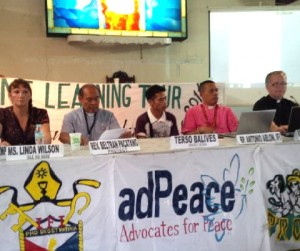Press Statement: The Rock Hard Truth—Philippine Learning Tour raises concerns about mining-related human rights violations in the Zamboanga peninsula

Press Statement
August 6, 2014
The Rock Hard Truth—Philippine Learning Tour raises concerns about mining-related human rights violations in the Zamboanga peninsula
We, the Canadian and Philippine delegates of the Philippine Learning Tour, have journeyed as partners to study and investigate the impact of Canadian mining operations in the Zamboanga peninsula. As persons seeking to promote good stewardship of the environment and respect of human rights for all, including the cultural right of self-determination for Indigenous peoples, we stand together to raise a voice of concern for the potential human rights and environmental impacts of ongoing and impending large-scale mining operations in the region.
 The Philippine Learning Tour sought to better understand the impact of existing and proposed mining operations in Zamboanga del Sur, as well as the filing of the Writ of Kalikasan by concerned environmentalists, Indigenous peoples, and church people for the Zamboanga peninsula.
The Philippine Learning Tour sought to better understand the impact of existing and proposed mining operations in Zamboanga del Sur, as well as the filing of the Writ of Kalikasan by concerned environmentalists, Indigenous peoples, and church people for the Zamboanga peninsula.
This moment of pause under the Writ of Kalikasan is an opportunity to study the situation and to discern that, similar to other locations around the world, the introduction of mining has coincided with reported incidences of manipulation, displacement, harassment and extra-judicial killings. Due to their geographic proximity, some may say that the Subanen people of Zamboanga del Sur are accidentally impacted by large-scale mining interests, but this is not the entire picture.
The Philippine Learning Tour members have come to understand that the Subanen people have an especially close relationship with the mountains that link them incontrovertibly to their environment. We have observed a deep reverence for the sacred mountains from this cultural minority, who primarily thrive as farmers, that greatly exceeds that coming from the dominant cultural value systems. To undermine their culture and way of life, not respecting their ancestral domain and their right to free, prior and informed consent as guaranteed by the United Nations Declaration on the Rights of Indigenous Peoples, and to displace them from their lands, is tantamount to destroying who they are as peoples. This testimony mirrors the lived experience of the First Nations members of the Learning Tour.
Purposefully, the Philippine Learning Tour engaged in dialogue with two municipalities, Midsalip and Bayog. Midsalip was chosen because it is in the early stages of large-scale mining applications, while in Bayog, land clearing and the installation of infrastructure at the mine site has begun. We wanted to journey with the people of these communities to learn more about the impact at various stages of mining resource extraction.
First and foremost, we learned that the Subanen people are not sufficiently respected and valued. We were disturbed to discover that many young people, though clearly bright and full of potential, have either dropped out of school or are enrolled in levels well beneath the national average for their age. The sad correlation with the experience of Indigenous peoples in Canada was noted by Learning Tour members.
Staggering poverty was glaringly obvious in both municipalities. Significantly, both communities demonstrated stress and the fracturing of Subanen unity in regard to the entry or operations of large-scale mining.
We heard testimonies of extra-judicial killings, torture, assault, illegal detention, intimidation, harassment and forced displacement. TVI Resource Development (Phils.) Inc. (TVIRD) officials told us that they work with the SCAA, a Philippine government trained security force that works with mining companies to protect their interests. In addition, the TVIRD officials told us that they retain through a private security company their own guards – the so called “blue guards” – who are under the direct control of TVIRD agents. The people we spoke to told us about how members of “blue guards” have acted in ways that devalue human dignity and that demonstrate an alarming disregard for the human rights of the Subanen people in Bayog. Alleged incidents of human rights violations were a common thread in the interviews we conducted, and the people’s fear is palpable as they believe their lives are in danger.
Members of the Philippine Learning Tour, a shared pilgrimage of visiting Canadians and Filipino church people, students and Indigenous people of the Zamboanga peninsula, were told that the Mining Act of 1995 promotes foreign interests over national welfare and the security of people in communities where mining interests are focused. Rather than serving the interests of the original and local inhabitants, we were told, under the current legislation, development creates division and disunity and can often result in displacing Indigenous peoples from the land they have held sacred for generations.
We call on the Philippine Government and the National Commission on Indigenous Peoples to be accountable for mining laws and policies that leave the environment vulnerable to massive plunder and irreversible destruction, and subject the Filipino people, especially Indigenous peoples, to widespread violations of their political, cultural, and economic rights. We pray that the Writ of Kalikasan may bring legal remedies to the aid of the threatened environment and those who desire to protect it.
We call on the Canadian government to ensure that Canadian companies operating overseas act in a way that respects and upholds human rights and does not damage the environment.
Canadian Learning Tour members will share the information it has gathered with the Canadian public through its member churches and civil society organizations in order to raise awareness and to generate support for action in support of the communities affected by Canadian mining companies operating in the Philippines.
KAIROS Canada and its partners will use the information gathered on the Philippine Learning Tour to educate Canadians about how Canadian mining activities impact Indigenous and non-Indigenous communities in the Philippines, and to inform action campaigns to support those communities. This will include dialogue with TVI Pacific in Manila and Canada.
The information will be used to help inform the Open for Justice campaign, launched in October 2013, and promoted by KAIROS. This campaign calls for federal legislation to hold Canadian companies accountable when they are complicit in human rights or environmental violations overseas, and for the Government of Canada to create a mandatory extractive-sector Ombudsman.
The vast and verdant ecosystems of Zamboanga continue to be under imminent and impending environmental risk —this is the rock-hard truth. We express our deep concern for the safety of the many people who have courageously shared their stories with us and all of our actions are intended to draw attention to their situation and ensure their well-being. People of both nations-Canada and The Philippines–must stand in defense of the environment and the promotion of human rights of all people, especially the right to self-determination of the Subanen peoples of the Zamboanga peninsula.
###
The Philippine Learning Tour is a one-week study by a Canadian delegation coordinated by KAIROS: Canadian Ecumenical Justice Initiatives, a social justice organization of eleven churches and religious organizations, in partnership with a Philippine delegation of church workers coming from different churches and the Rural Missionaries of the Philippines, Indigenous people including the advocacy officer of Task Force for Indigenous Peoples and students coming from different schools in Zamboanga Peninsula. In addition to participants from KAIROS Canada, the Canadian delegation includes participants from MiningWatch, the Canada Union of Public Employees, and Idle No More, a grassroots organization in Canada that advocates for the recognition and protection of Indigenous Peoples’ in Canada). The tour is spearheaded by PROTECT–a people’s organization working to defend patrimony against destructive large-scale mining, environmental plunder and development aggression.








